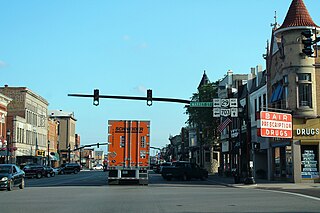
Celina is a city in and the county seat of Mercer County, Ohio, United States about 58 miles northwest of Dayton. The population was 10,400 at the 2010 census. Celina is situated on the northwestern shores of Grand Lake St. Marys.

Grand Lake St. Marys State Park is a public recreation area located on 13,500-acre (5,500 ha) Grand Lake in Mercer and Auglaize counties, Ohio. Grand Lake is the largest inland lake in Ohio in terms of area, but is shallow, with an average depth of only 5–7 feet (1.5–2.1 m). The state park is open for year-round recreation, including boating, fishing, swimming and hunting. The park consists of the lake and park facilities scattered all around the shore intermingled with private property and a facility operated by Wright State University. It is west of St. Marys, and south-east of Celina, 23 miles (37 km) south-west of Lima in the north-western part of Ohio.

Maria Stein is an unincorporated community in central Marion Township, Mercer County, Ohio, United States. The community and the Maria Stein Convent lie at the center of the area known as the Land of the Cross-Tipped Churches, where a missionary priest, Father Francis de Sales Brunner, established a number of parishes for German Catholics.

Buffalo (Main) Light is a lighthouse at the mouth of Buffalo River/Erie Canal, directly across from the Erie Basin Marina in Buffalo, New York.

St. Patrick's Church is an historic Roman Catholic church in Glynwood, an unincorporated community in Moulton Township, Auglaize County, Ohio, United States. Located north of U.S. Route 33 between St. Marys and Wapakoneta, the church was built in 1883 in the Gothic Revival style. It is one of many large Catholic churches in a region of rural western Ohio known as the "Land of the Cross-Tipped Churches," which was settled by primarily Catholic immigrants during the nineteenth century.

The New Canal Light or was first established in 1838 at the north end of the New Basin Canal which ran from Lake Pontchartrain to the Uptown or "American" section of the city which today is known as the New Orleans Central Business District. The canal was filled in about 1950, but the lighthouse remained on a jetty extending into the lake on a half mile long stretch of the canal that was left and is still used as a small boat and yachting harbor.

St. Anthony's Catholic Church is a historic Roman Catholic church in Padua, an unincorporated community in Washington Township, Mercer County, Ohio, United States. Built in the late nineteenth century, it remains the home of a functioning congregation, and it has been recognized as a historically significant building because of its architecture.

St. Henry's Catholic Church is a historic Roman Catholic church in St. Henry, Ohio, United States. Built in the late nineteenth century, it remains the home of a functioning congregation, and it has been recognized as a historically significant building because of its architecture.

St. John the Baptist Catholic Church is a historic Roman Catholic church in Marion Township, Mercer County, Ohio, United States. Located in the unincorporated community of Maria Stein, it is the home of an active congregation and has been recognized as a historic site because of its well-preserved late nineteenth-century Romanesque Revival architecture.

St. John's Catholic Church is a historic Roman Catholic church on the Allen County side of Delphos, Ohio, United States. Designed by S.W. Lane, it has been recognized as a historic site because of its architecture.

Holy Rosary Catholic Church is a Roman Catholic parish on the east side of St. Marys, Ohio, United States. Established in 1852, the church has been recognized for its historic 1860s church building, which was demolished amid a period of growth in the 1970s and replaced with a modernist structure.
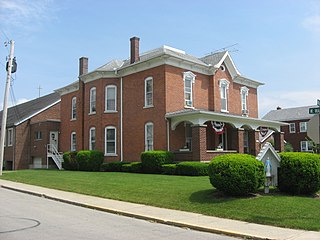
Immaculate Conception Catholic Church is a Roman Catholic parish in Botkins, Ohio, United States. Erected in 1865, the parish owns a complex of buildings constructed in a wide range of years, including two that have been designated as historic sites.

Precious Blood Catholic Church is a Roman Catholic parish in Chickasaw, Ohio, United States. Erected in 1903 and still an active parish, the church historically owned two buildings constructed in its early years that have been designated as historic sites.

St. Sebastian's Catholic Church is a historic Roman Catholic church in Marion Township, Mercer County, Ohio, United States. Located in the unincorporated community of Sebastian, it is the home of an active congregation and has been declared a historic site because of its well-preserved early twentieth-century Gothic Revival architecture.
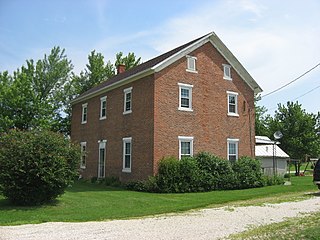
The Gruenwald Convent is a historic former Roman Catholic convent in the far western part of the U.S. state of Ohio. Located approximately 0.5 miles (0.80 km) south of the small community of Cassella in Mercer County, the convent was built in 1854. It is one of six convents that were built by the Missionaries of the Precious Blood in this portion of Ohio and in adjacent portions of far eastern Indiana, and one of only two that remain without significant alterations.
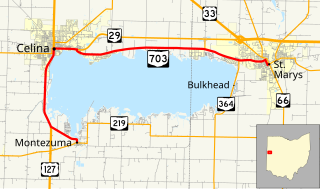
State Route 703 (SR 703) is a state highway in western Ohio. Its western terminus is in Montezuma at SR 219, and its eastern terminus is in St. Marys at an intersection with SR 29, SR 66, and the southern terminus of SR 116 in St. Marys. The route is mainly an east–west highway along the shores of Grand Lake St. Marys, although the section between Celina and Montezuma travels in a more north-south fashion.

Cassella is an unincorporated community in Marion Township, Mercer County, Ohio, United States. Located at 40°24′22″N84°33′8″W, it lies at an elevation of 955 feet (291 m). Situated at the intersection of State Route 119 and Cassella-Montezuma Road in western Marion Township, it lies in the headwaters of Beaver Creek to the south of the city of Celina, the county seat of Mercer County. Other nearby communities include Maria Stein, 3 miles (4.8 km) to the east, Carthagena, 2 miles (3.2 km) to the north, and St. Henry, 4 miles (6.4 km) to the west.
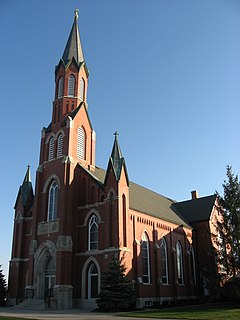
St. Rose's Catholic Church is a historic Catholic church in St. Rose, an unincorporated community in Marion Township, Mercer County, Ohio, United States.

Immaculate Conception Catholic Church is a parish of the Roman Catholic Church in Celina, Ohio, United States. Founded later than many other Catholic parishes in the heavily Catholic region of western Ohio, it owns a complex of buildings constructed in the early 20th century that have been designated historic sites because of their architecture. Leading among them is its massive church, built in the Romanesque Revival style just 43 years after the first Catholic moved into the city: it has been called northwestern Ohio's grandest church building.
Wright State University-Lake Campus is a branch campus of Wright State University located between Celina, Ohio, and St. Marys, Ohio. The 211-acre campus sits on the northern shore of Grand Lake St. Marys at 7600 Lake Campus Drive, Celina, OH 45822. Founded in 1962 by the Western Ohio Educational Foundation, a 501c3 organization created to support higher education in the Mercer and Auglaize counties region of Ohio, the school was affiliated with Ohio Northern University before it became a branch campus of Wright State University in 1969. Located near Dayton, Ohio, Wright State is part of the public university system of the state of Ohio.






















